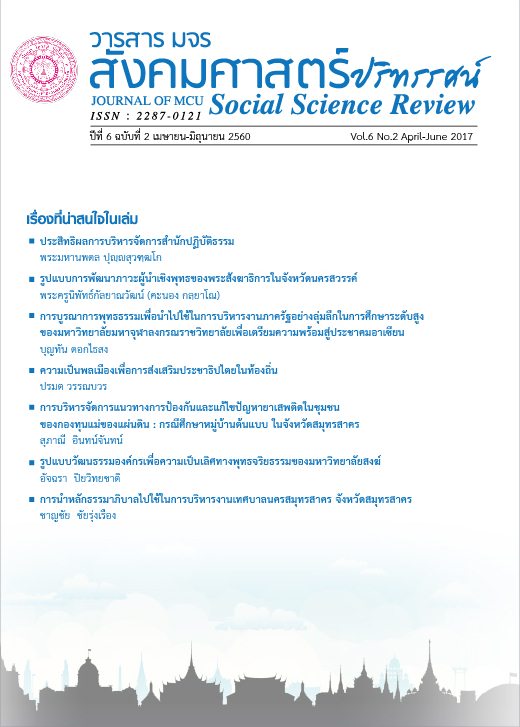ความเป็นพลเมืองเพื่อการส่งเสริมประชาธิปไตยในท้องถิ่น
คำสำคัญ:
ความเป็นพลเมือง ประชาธิปไตย หลักพุทธธรรมบทคัดย่อ
บทความวิจัยครั้งนี้มีวัตถุประสงค์ 1) เพื่อศึกษาความเป็นพลเมืองเพื่อการส่งเสริม
ประชาธิปไตยในท้องถิ่น 2) เพื่อศึกษาหลักธรรม แนวคิดและทฤษฎีสาหรับความเป็นพลเมืองเพื่อ
การส่งเสริมประชาธิปไตยในท้องถิ่น และ 3) เพื่อศึกษาแนวทางในการสร้างความเป็นพลเมืองเพื่อ
การส่งเสริมประชาธิปไตยในท้องถิ่นตามแนวทางพระพุทธศาสนา ระเบียบวิธีวิจัยเป็นการวิจัยเชิง
ผสานวิธีระหว่างการวิจัยเชิงคุณภาพกับการวิจัยเชิงปริมาณ โดยเก็บข้อมูลจากการสัมภาษณ์
รายบุคคล จานวน 22 รูป/คน และจากแบบสอบถามจานวน 399 คน/ชุด
ผลการวิจัยพบว่า
1. ความเป็นพลเมืองเพื่อการส่งเสริมประชาธิปไตยในท้องถิ่น พบว่า มีลักษณะสามารถควบคุมตนเองให้อยู่ในกรอบของศีลธรรมโดยยึดมั่นและเชื่อมั่นในสิ่งที่ถูกต้องและเป็นธรรม มีความเป็นตัวของตัวเอง มีความรู้ความเข้าใจทางการเมืองเคารพหลักความเสมอภาค เคารพสิทธิของกันและกัน เท่าเทียมกัน กล้าเสนอความคิดต่อส่วนรวม ให้เวลากับกิจกรรมทางการเมืองคานึงถึงประโยชน์ส่วนใหญ่ ยึดถือกติกาของสังคมเป็นหลัก ใช้เหตุผลมากกว่าใช้อารมณ์ มีน้าใจ เลือกรับข่าวที่เหมาะสมและมีประโยชน์ พึ่งตนเอง ดารงชีวิตตามปรัชญาเศรษฐกิจพอเพียง ไม่อยู่ภายใต้การครอบงาหรือความอุปถัมภ์ของใคร กล้าแสดงออก มีความรับผิดชอบในตนเองในขณะที่ความเป็นพลเมืองในการส่งเสริมประชาธิปไตยในท้องถิ่น โดยรวมอยู่ในระดับมาก ( X = 3.55) เมื่อพิจารณาเป็นรายด้านจากมากไปหาน้อย (1) ด้านการยึดมั่นในหลักธรรมตามแนวทางพระพุทธศาสนา (X =3.89) (2) ด้านบุคลิกภาพประชาธิปไตย (X = 3.63) และ (3) ด้านการมีส่วนร่วมทางการเมือง (X = 3.46) (4) ด้านกระบวนการกล่อมเกลาเรียนรู้ทางการเมือง (X = 3.39) และ (5) ด้านการยึดถือค่านิยมพื้นฐานทางการเมืองแบบประชาธิปไตย (X= 3.38) ตามลำดับ
2. หลักธรรม แนวคิดและทฤษฎีสาหรับความเป็นพลเมืองเพื่อการส่งเสริมประชาธิปไตยโดยการยึดมั่นในหลักพุทธธรรม คือ หลักสัปปุริสธรรม 7 ข้อ พบว่า (1) การเป็นผู้รู้จักเหตุ รู้จักหน้าที่ พบว่าได้มีความรับผิดชอบต่อสังคมโดยมีการยึดถือคาสั่งสอนของศาสนามาเป็นเครื่องมือในการปฏิบัติในชีวิตประจาวัน มีการสานึกในหน้าที่ที่รับผิดชอบ และรู้จักลาดับความคิดไตร่ตรองปัญหารู้หน้าที่ของตนเองเข้าใจตระหนักในหน้าที่ของตนเอง ข้อที่ (2) การเป็นผู้รู้จักผล รู้จักเป้าหมาย พบว่าได้มีการคานึงถึงประโยชน์ของส่วนรวม มีวิสัยทัศน์ที่กว้างไกล มีเป้าหมายในทางความดีงามเพื่อเป็นคนที่มีเหตุผล และรู้ว่าเป็นประโยชน์แก่ตนเองและคนรอบข้าง และมีการยอมรับความเป็นจริงของผลที่เกิดขึ้น ข้อที่ (3) การเป็นบุคคลที่รู้จักตนเป็นใคร พบว่าได้มีการพัฒนาศักยภาพของตนเองให้รู้เท่าทันการเปลี่ยนแปลงของสังคม มีความรู้ทางการเมืองในระบอบประชาธิปไตย มีบทบาทหน้าที่อย่างไรในสังคม ข้อที่ (4) การรู้จักประมาณ รู้จักความพอดี พบว่าได้มีการรู้จักถึงความพอเหมาะ รู้จักพอดีและพอเพียงในการดาเนินชีวิต พึ่งตนเอง อยู่อย่างพอเพียงเลี้ยงตนบนสัมมาชีพและวางตนให้เหมาะสมกับสถานการณ์ทางการเมืองได้ ข้อที่ (5) การรู้จักกาลเวลาอันเหมาะสมพบว่าได้ใช้ดุลยพินิจในการใช้เวลาให้เหมาะสมระหว่างประชาธิปไตยกับพุทธศาสนาที่มีความเหมาะสมใกล้เคียงกันในหลายมิติ รู้จักแสดงออกให้เหมาะสมกับกาลเวลาในการเอาใจใส่บ้านเมืองในการมีส่วนร่วมตัดสินใจ ข้อที่ (6) การรู้จักชุมชน รู้จักระเบียบในสังคม พบว่าได้ปฏิบัติตนเหมาะสมกับสภาพของสังคม รู้จักและเคารพระเบียบกฎเกณฑ์ของสังคม และรู้ถึงจารีตขนบธรรมเนียมของชุมชนและข้อที่ (7) การรู้จักบุคคล หรือการรู้จักอุปนิสัยใจคอและอารมณ์ของผู้อื่นพบว่าได้มีการเรียนรู้ในการอยู่ร่วมกับผู้อื่น เข้าใจพื้นเพ ใจคอ เข้าใจอารมณ์ของคนในชุมชนมีการยอมรับข้อดีข้อเสียของตนเองและของผู้อื่นเรียนรู้การการดาเนินชีวิตร่วมกัน
3. แนวทางในการสร้างความเป็นพลเมืองเพื่อการส่งเสริมประชาธิปไตยในท้องถิ่นด้านการยึดมั่นในหลักธรรมตามแนวทางพุทธศาสนา พบว่า ประชาชนได้ยึดหลักธรรมเป็นแนวทางในการใช้วิถีชีวิตเป็นทุนทางสังคมอยู่แล้ว การส่งเสริมประชาธิปไตยมีพื้นฐานจากการยึดถือปฏิบัติในหลักพระพุทธศาสนาให้เป็นจริงก่อน หลังจากนั้นอาศัยความร่วมมือระหว่างบุคคล ครอบครัว โรงเรียนวัดและหน่วยงานภาครัฐที่เกี่ยวข้องกับท้องถิ่น ในการปลูกฝัง การอบรม การส่งเสริม การจัดกิจกรรม และการประชาสัมพันธ์ ให้เกิดความรู้ความเข้าใจพื้นฐานทางการเมืองแบบประชาธิปไตยที่ถูกต้องและเหมาะสมในท้องถิ่นและมีความรู้หลักพุทธธรรมให้เช้าใจและปฏิบัติได้จริง เกิดชุมชนแห่งการเรียนรู้การเมืองกับหลักพุทธธรรม
เอกสารอ้างอิง
Teerapong Chuenchop. (2555). Political Socialization and Democratic Political Culture Development in the Curriculum of Social Studies at Elementary and Secondary Levels (Research Report) the 48th Academic Proceedings of the Faculties of Humanity and Social Sciences. Kasetsart University.
Phradhammapidok (P.A.Payutto). (2543). Learning Process for Human Development toward Democracy. Bangkok: Mahachulalongornrajavidhyalaya University.
Phramahacompet Vachirapanyo. (2552). Application of Sappurisadhamma in Local Administrative Organization Administration: A Case Study of Sub-Districts
in Bangbuatong District Nontaburi Province (Academic Article). Graduate School: Mahachulalongornrajavidhyalaya University.
Anurak Kengreorn. (2558). Development of Meritocracy and Civil Politics in Thai Society during 2547-2557 B.E. (Doctoral Thesis). Graduate School: Rankamhaeng University.
Apichart Pansuwan. (2558). Development of Community Leader Characteristics in Municipality, Ayuthaya Province (Doctoral Thesis). Graduate School: Mahachulalongkornrajavidhayalaya University.
Chananporn Areekul. (2559, May-August). Social Capital and Life Long Learning Society Development. MCU Journal of Social Sciences, 5(2), 249.
Charnchai Chairungreorng. (2559, May-August). People Participation in Strong Community Creation in Pakkred Municipality Nontaburi Province. MCU Journal of Social Sciences, 5(2), 115-116.
Wanmaka Kesorndogmai and Tanawat Pimoljinda. (2559, May-August). Administration of Sufficiency Economy Villages: Problems and Continuity.MCU Journal of Social Sciences, 5(2),107.
ดาวน์โหลด
เผยแพร่แล้ว
รูปแบบการอ้างอิง
ฉบับ
ประเภทบทความ
สัญญาอนุญาต
ลิขสิทธิ์ (c) 2018 วารสาร มจร สังคมศาสตร์ปริทรรศน์

อนุญาตภายใต้เงื่อนไข Creative Commons Attribution-NonCommercial-NoDerivatives 4.0 International License.
เพื่อให้เป็นไปตามกฎหมายลิขสิทธิ์ ผู้นิพนธ์ทุกท่านต้องลงลายมือชื่อในแบบฟอร์มใบมอบลิขสิทธิ์บทความให้แก่วารสารฯ พร้อมกับบทความต้นฉบับที่ได้แก้ไขครั้งสุดท้าย นอกจากนี้ ผู้นิพนธ์ทุกท่านต้องยืนยันว่าบทความต้นฉบับที่ส่งมาตีพิมพ์นั้น ได้ส่งมาตีพิมพ์เฉพาะในวารสาร มจร สังคมศาสตร์ปริทรรศน์ เพียงแห่งเดียวเท่านั้น หากมีการใช้ภาพหรือตารางหรือเนื้อหาอื่นๆ ของผู้นิพนธ์อื่นที่ปรากฏในสิ่งตีพิมพ์อื่นมาแล้ว ผู้นิพนธ์ต้องขออนุญาตเจ้าของลิขสิทธิ์ก่อน พร้อมทั้งแสดงหนังสือที่ได้รับการยินยอมต่อบรรณาธิการ ก่อนที่บทความจะได้รับการตีพิมพ์ หากไม่เป็นไปตามข้อกำหนดเบื้องต้น ทางวารสารจะถอดบทความของท่านออกโดยไม่มีข้อยกเว้นใดๆ ทั้งสิ้น





